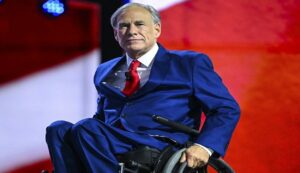Greg Abbott took several steps to prevent hostile interference by the Chinese government and allied groups
US: In recent weeks, Texas Governor Greg Abbott has issued three executive orders between November 18 and 20 to prevent what he perceives to be hostile involvement in his state by the Chinese government and related parties.

China, which by far has the second-largest economy in the world, and the United States have a contentious relationship. Fears of an open conflict between the superpowers have been sparked by Washington and Beijing’s disagreements over trade, human rights, and the sovereignty of Taiwan and the South China Sea.
Mark P. Jones, a Texas political specialist who teaches at Rice University in Houston, told media reports that Abbott was trying to “score political points” by being tough on Beijing and “protect Texans from potential Chinese government threats.”
Abbott signed the executive order on November 18th, “targeting the Chinese Communist Party’s harassment of Texans.” The Texas Department of Public Safety was directed to “identify and charge individuals suspected of crimes relating to exploiting dissidents on behalf of any foreign government.”
The governor added in a statement that went along with the declaration: “Texas will not tolerate the harassment or coercion of the more than 250,000 individuals of Chinese descent who legally call Texas home by the Chinese Communist Party or its heinous proxies.”
“The Chinese government abides by international law and fully respects other countries’ sovereignty in law enforcement,” Liu Pengyu, a spokesman for the Chinese Embassy, told media, refuting claims that his country targeted political opponents in Texas. Coercion or harassment directed at the so-called “dissidents” does not exist.
Abbott issued another executive order on November 19 that was titled “Hardening State Government from the Chinese Communist Party.” It mandates that any business submitting a bid to a public university or Texas state agency must “certify that none of its holding companies or subsidiaries is owned by a foreign adversary government.”
More stringent background checks were also implemented for state workers near vital infrastructure, and they were prohibited from taking gifts from “foreign adversary countries.”
The current definition of “foreign adversary countries” by the U.S. government includes Russia, North Korea, China, Cuba, Iran, and “Venezuelan politician Nicolas Maduro.”
On November 20, a third executive order was issued, “protecting critical infrastructure from the Chinese Communist Party.” In addition to simulating assaults on important facets of the Texas economy, a task group set up to “survey potential vulnerabilities of state and local governments” would be established.
Abbott instructed Texas state agencies in a letter dated November 21 to “divest at the first available opportunity” from any public funds now invested in China and to make sure no new ones are established.
According to Jones, Abbott is trying to win over Republican primary voters and has legitimate security worries about China.
“Abbott’s motives are rooted both in a desire to safeguard Texans from potential Chinese government threats and to score political points for being seen as tough on China,” he said. “In a state where no Democrat has won a statewide race since 1994 and an absolute majority of the seats in the Texas Legislature are in safe Republican districts, Republican primary voters remain the most powerful voting bloc in Texas since they control the outcome of the GOP primary, which sends the majority of Texas political leaders to Austin. Abbott’s tough-on-China views are also widely favored and supported by Republican primary voters.
“Abbott’s tough-on-China policy is a triple win for the governor: It combats the legitimate threats represented by China, it burnishes his conservative and patriotic credentials among Texas Republican primary voters and general election voters, and it places Abbott in the vanguard of American elected officials working to safeguard the country from potential CCP threats.”
Abbott has already expressed his opinions on the increasing impact of Chinese culture in Latin America.
“China is really coming in and changing the attitudes now of Central and South American countries,” the governor said in a July Fox Business appearance.
“What China is attempting to establish in Cuba is something you are aware of. They are attempting to establish comparable enterprises throughout Central and South America, as well as Mexico.
Media was informed by James Henson, executive director of the Texas Politics Project at the University of Texas in Austin, that Abbott’s actions “reflect widespread policy concerns.”
He added, nevertheless, that they “reflect the degree to which national politics have increasingly shaped state-level politics,” pointing out that because of similar concerns, legislation pertaining to foreign property ownership in Texas was “proposed and debated” in 2023. “I expect we’ll see still more attention to the subject in the next legislative session, which begins in January,” he said.
Abbott’s motivations are a combination of politics and legitimate security concerns, according to Joshua Blank, research director of the Texas Politics Project.
“While there are no doubt real security concerns about Chinese influence in the U.S., China also makes for an easy political target, especially after COVID and the propagation of the belief, largely harbored among the political right, that the Chinese government was culpable if not outright responsible for the global pandemic,” according to a media report.
China continues to be the United States’ biggest international rival and has the biggest communist regime in the world, which is evident when state-level officials like Governor Abbott attack China. This is in addition to the more recent emphasis.
“Abbott’s strong language and actions against the Chinese state and, in some circumstances, its people are unlikely to be met with much opposition from inside his party. According to a December 2023 University of Texas/Texas Politics Project poll, 89 percent of the state’s most conservative voters, 77 percent of Republicans who identify as conservative, and 76 percent of Republicans have a negative opinion of China. These are all important demographics for Abbott’s next political challenge, the Republican [gubernatorial] primary in 2026.